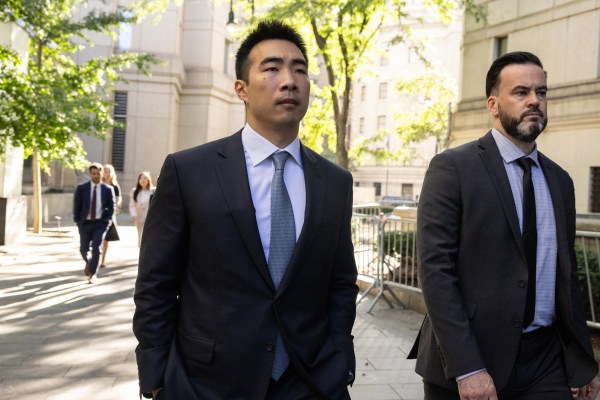The testimony of Matt Huang, co-founder and managing partner of crypto investment firm Paradigm, at Sam Bankman-Fried’s trial may help the prosecution convince jurors that the former crypto mogul defrauded investors.
Huang testified Thursday that he and his firm were in the dark about a range of business practices at FTX, red flags that would have affected his decision to invest in the company. Namely, FTX’s use of customer funds to prop up Bankman-Fried‘s hedge fund Alameda Research.
Government cooperation aside, Huang likely has his own motives for testifying against Bankman-Fried and distancing his firm from FTX. Paradigm is part of a class action lawsuit (which was temporarily stayed in June) that accuses it, alongside Sequoia Capital and Thoma Bravo, of promoting FTX to the detriment of its users.
According to Huang’s testimony, Paradigm was duped, as well.
Over two funding rounds between 2021 and 2022, Paradigm invested $278 million into FTX. When prosecutor Thane Rehn asked what Paradigm estimates the current value of that investment to be, Huang replied, “We have marked it to zero.”
That establishes damage has been done in the form of financial losses, one of the things the prosecution will have to establish in order to prove fraud.
The government will also have to establish misrepresentation, showing that the defendant made false statements or concealed material information in order to convince investors to fork over money. Prosecutors also need to prove that the investors relied on Bankman-Fried’s misrepresentations. Finally, they’ll need to demonstrate that Bankman-Fried intended to defraud investors, which could be more difficult.
Huang’s testimony Thursday at least supports the establishment of three out of four of those elements.
Paradigm began considering investment into FTX in 2019, according to Huang. During that time, Huang testified that he was told FTX exchange wallets served as a custodian for customer deposits and would always be available if customers wished to withdraw. He wasn’t told that FTX could take those deposits out and use them for their own business purposes.
When asked if he would have still invested in FTX knowing that, Huang responded, “Likely not.”
“If it became known that they were doing that, I think the exchange would lose credibility in the brand and people wouldn’t want to use it, so it would be existential to the business,” said Huang.
Not only was Huang uninformed about FTX’s habit of using customer deposits for its own purposes, but he also testified that he didn’t know Alameda was able to access those deposits, and wouldn’t have invested in FTX if he had.
“Customer deposits are sort of sacred,” he said.
As Paradigm was considering investment into FTX, Huang said he raised concerns about the link between Alameda and FTX. Mainly, he was worried that Alameda — one of the largest traders on the platform — would get preferential treatment, which would also be damaging to FTX’s reputation.
Bankman-Fried told Huang Alameda didn’t have preferential treatment on the platform. But the prosecution pointed out that Alameda was exempt from FTX’s liquidation engine, a risk management strategy that’s designed to automatically trigger the sale of assets if certain risk parameters are exceeded.
Huang said FTX’s liquidation engine was a big part of why Paradigm was attracted to the company. He also agreed that Alameda’s exemption is inconsistent with Bankman-Fried’s statement that it didn’t get preferential treatment.
“It would have meant that Alameda could trade with leverage on the platform and, if those trades didn’t work out, could ultimately incur a negative balance that would have to be paid for somehow,” said Huang. “In a typical case, that might come from the money we were investing into the company that would go to fund operations. But in any case, it would leave the business at risk of becoming insolvent.”
Rehn also sought to establish that Bankman-Fried made false statements to lull Paradigm into investing. He pulled up an Excel spreadsheet that had been attached to an email Bankman-Fried sent to Huang showing FTX’s financial stats as of April 2021. The balance sheet showed FTX’s annualized approximate revenue, estimating a net profit for Q1 2021 of $85 million. Rehn asserted that FTX had moved certain expenses off those financial statements in order to artificially inflate the reported net profits.
Throughout his testimony, Huang repeated that he had also expressed concerns with Bankman-Fried over FTX’s lack of a board and lack of governance, which he said could lead to unintended value leakage. While this did not ultimately stop Paradigm from investing in FTX, Huang testified that “SBF was very resistant to having investors on the board.”
